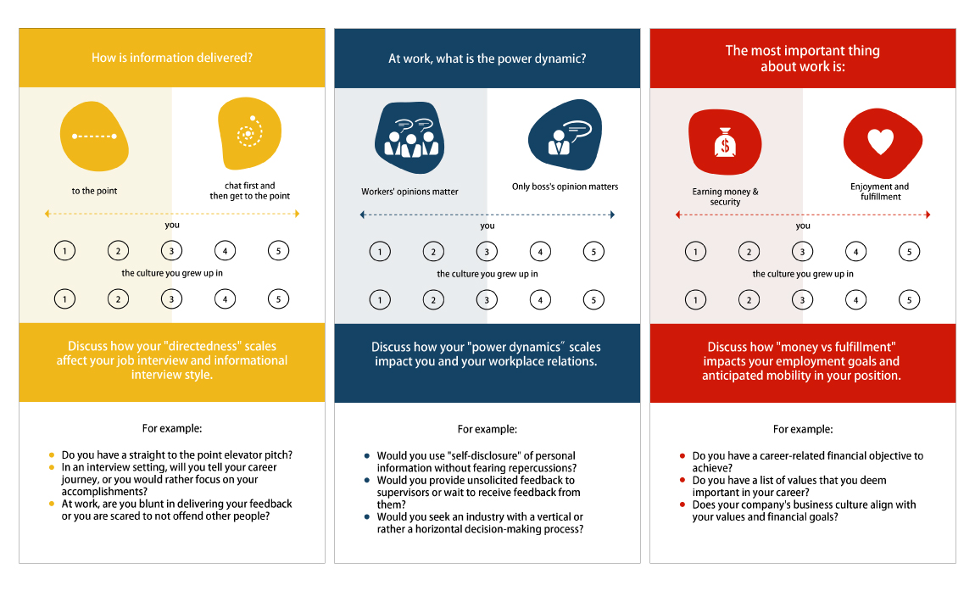
Working with Muslim clients: Adopting multicultural and social justice counselling competencies
January 19, 2021
Anti-racism from the inside out: Challenging white supremacy in the workplace
January 19, 2021Self-awareness can positively affect students’ employment outcomes
Antonio Fadda

Barriers to employability
It is essential for career professionals to understand the experiences of international students in their host country to leverage identity exploration as a career development tool. In Canada, the academic environment is generally welcoming to international students. Approximately 93% of students are satisfied (55%) or greatly satisfied (38%) with their Canadian educational experience (Canadian Bureau, 2018). However, outside of school, students might encounter various forms of discrimination, including career-related discrimination. International students have to quickly adapt to a relatively unknown and unpredictable job market in a position of disadvantage (compared to domestic students).
Two of the most apparent barriers are a lack of experience in the host market and the absence of a social and professional network in the host country. A third barrier is employers’ misperceptions or lack of awareness of work policies and legislation relating to international students (Berquist et al., 2019). For example, our students often report that employers have serious concerns about the legal framework to hire a student with a post-graduation temporary work permit. These challenges have contributed to creating a student population that is highly concerned about their employability prospects.
“It is essential for career professionals to understand the experiences of international students in their host country to leverage identity exploration as a career development tool.”
International students also directly experience career-related discrimination. Employers are about 40% more likely to select a candidate with an English-sounding name versus someone with an “ethnic” name (Banerjee et al., 2018). Further, international students who identify as visible minorities or BIPOC (Black, Indigenous, people of colour) might face additional challenges (Statistics Canada, 2020).
Finally, annual tuition fee increases are far higher for international students than domestic students. While there is a 2% yearly increase cap in tuition fees for domestic students in BC, there is no regulation for international students’ fees. This issue has ethical implications for our profession because post-secondary institutions’ rationale for increased tuition fees is expanding support services (including career support) dedicated to international students. However, students have also reported that they have not seen significant changes in the quality and quantity of support dedicated to them (Hyslop, 2019).
Furthermore, sudden and unexpected increases in tuition fees might push students to work more than the 20 hours/week permitted by their visa. This tense financial situation has predictable consequences for their well-being and future employability prospects.
Given this scenario, institutions should not set unrealistic expectations of idyllic integration, but rather strive to equip international students with crucial skills in cultural competence, self-awareness/advocacy and self-determination. The extension of career services should be key to these educational objectives, in line with the International Student Barometer’s indication that “future career impact” has become students’ primary motivator for studying abroad (Ripmeester, 2019, as cited in Reichert, 2020).
The key to career success and empowerment
One of the main goals of higher education is developing self-aware and socially conscious individuals who can confidently transfer their skills from the classroom to the workplace. Ideally, students are ready to enter the workforce with a sense of empowerment from knowing who they are and what they have gained from their academic journey. However, the current situation is far from ideal.
More from Careering
Equipping international students to navigate culture difference in job search
Developing trans-inclusive career resources for students
Working with Muslim clients: Adopting multicultural and social justice counselling competencies
In this respect, educational and career objectives intersect. Career professionals need to recognize that international students’ personal and socio-cultural development is substantially different from that of local students. International students need to have opportunities to explore their cultural identities (and even the biases that affect them).
The students’ language is rarely that of identity. They would rather talk about changes in their confidence, motivation, perceptions and worldviews. However, as career practitioners and advisors, we should be aware that these developments are ultimately connected to identity development. As such, the formation of realistic identity positively influences students’ employment outcomes and career success, promoting experimentation in critical decisions concerning relationships, purpose and integrity (Widick et al.,1978).
Helping students explore identity
Identity development is well-grounded in developmental psychology and advising theory. As Chickering noted, identity is the most central and yet the most elusive component of student development (Chickering as cited in Widick et al., 1978, p. 24). This can present a greater challenge to international students. They are not only negotiating their development into adulthood, but they also have to deal with a transforming cultural identity within a new and unfamiliar cultural environment. Career advisors must understand that international students are developing (often with internal and external conflicts) a realistic self-representation of a new identity.
At Empower International Students, a grassroots, community-based organization, we are committed to increasing international students’ employability skills in their transition to the Canadian job market. Empower International Students is devoted to empowering international students with career education that helps them “find their authentic voice.”
Empower has recently partnered with an innovative program designed and run by Options Community Services and sponsored by Immigration, Refugees, Citizenship Canada, called HuH – Humans Understanding Humans. HuH’s team of social scientists, designers and newcomers have developed digital conversation cards based on multiple theories of cultural dimensionality (Humans Understanding Humans, n.d.). Participants can start a conversation and examine their cultural background and experiences using the prompts outlined on the cards. The topics connect the exploration of personal and cultural identities with career goals and career development attitudes.

HuH conversation cards adapted to career development (Cards graphics HuH team).
The card content is discussed in video meetings with pairs of participants. This way each participant has the opportunity to share his/her story, increasing their confidence and self-acceptance of their cultural identity while reflecting on their career goals. HuH digital conversation cards can be a valuable tool to allow students to find their authentic voice and not get sidetracked during that complex identity transition from post-secondary to the workplace. They are easy to use and they allow for the creation of interactive chats and meaningful connections.
This project is a first attempt that only scratches the surface of an important issue in career development: that of creating new advising practices that connect career education with the exploration of cultural identity. What is certain is that career development can (and should) become an important tool to promote the greater educational goal to create culturally conscious and socially aware individuals. To reach this goal, international students and newcomers need the right tools to explore their developing identities as settlers who bring an invaluable and unique cultural background to their host country. The recognition of this background is the precondition for self-efficacy and success in their career exploration.
Antonio Fadda is an Employment Consultant at Work BC Burnaby Edmonds and a Career Services Facilitator at Empower International Students. He has been an advocate and active participant in several non-profit and institutional programs dedicated to empowering newcomers and international students.
References
Banerjee, R., Reitz, J. G., & Oreopoulos, P. (2018). Do Large Employers Treat Racial Minorities More Fairly? An Analysis of Canadian Field Experiment Data. Canadian Public Policy, 44(1), 1-12. doi:10.3138/cpp.2017-033
Berquist, B., Hall, R., Morris-Lange, S., Shields, H., Stern, V., & Tran, L. T. (2019). Global perspectives on international student employability. Retrieved from https://www.ieaa.org.au/research/global-employability
Canadian Bureau for International Education. (2018). The Student’s Voice: National Results of the 2018 CBIE International Student Survey. Retrieved from https://cbie.ca/wp-content/uploads/2018/08/Student_Voice_Report-ENG.pdf
Hyslop, K. (March 1, 2019). How much is too much tuition for BC’s International Students? Retrieved from https://thetyee.ca/News/2019/03/01/BC-International-Student-Tuition-Too-Much/
Humans Understanding Humans. (n.d.) Digital conversation cards. Retrieved from https://wearehuh.com/cards/
Reichert, P. (2020). Internationalization and Career-focused programming for international students: a qualitative study of universities in Canada (Unpublished doctoral thesis). University of Calgary.
Statistics Canada. (2020). Labour force survey, July 2020. Retrieved from https://www150.statcan.gc.ca/n1/daily-quotidien/200807/dq200807a-eng.htm
Widick, C., Parker, C, and Knefelkamp, L. (1978). Arthur Chickering’s vectors of development. New Direction for Student Services, 4, 19-34.

